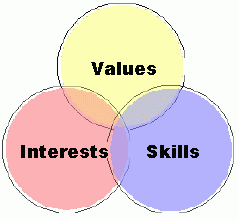There are four groups of skills that all trainees need to have to help ensure success in their careers. These skills are not only beneficial for success if your current role, but are vital skills to continue to develop in order to excel in future career paths. Below are descriptions of these skills sets and a listing of blog posts on each topic. Check out the posts to delve a bit further into each subject area.

Whether you are a postbac, graduate student, postdoc or clinical fellow, you probably have wondered how to blend your individual interests, values and skills into a satisfying career. Self-assessment is an integral part of an effective career planning process and involves asking yourself about your: Skills -How good am I at different lab techniques or giving talks? -How are my language, mentoring, training, writing and communication skills? Interests -What interests me?
Post written by Sharon Milgram, Director of The Office of Intramural Training & Education. Science careers, at or away from the bench, require us to be life-long learners. To be successful, we are always learning – and teaching – new skills. While many of us enjoy this, it also comes with frustrations and challenges. In considering how we learn, I was struck by the excellent and concise explanation of the stages we typically go through as we learn and develop new skills.
Do you need to find a job in a geographically limited area far from your current location? Maybe your significant other just found a dream job, or maybe you just always wanted to live in Seattle, WA – whatever the reason, a remote and geographically limited job search poses a distinct set of challenges that require some strategizing to overcome. Here are a few thoughts that may help from a person who recently was searching for a job in Dallas, TX, while living in Bethesda, MD. These tips are useful in any job search, but particularly for conducting a remote search.
Research is your top priority as a graduate student or postdoc.
One of the most common forms of professional communication is the ‘Presentation.’ No matter what career you have – professor, researcher, science policy analyst, CEO of a company – chances are you will have to prepare and deliver professional presentations. In fact, you probably give presentations regularly already – for lab meeting, at professional conferences, for your thesis proposal, or for your job interview. However, no matter why you are giving your talk, the goal is the same: Communicating and sharing information with your audience. Because of this, there are
Its interview season! This time of year we seem to see an increase in the number of institutions hiring people. Before they hire someone, they are going to interview at least a few people for each position. This is why we set September on our Calendar for Career Success to be the month that you
If you have been following out Calendar for Career Success, you know that August is the time to put together your job packages. Whether it be for an academic positions, a postdoc or a transition to a new career field, you need to have a competitive application. We have provided some information below
If you have been following our career development calendar on the blog, you know April is the time to plan your 2012 meeting or conference attendance. If you are relatively new to this experience you should watch our web tutorial on atten
If you have been following the blog calendar, you have been thinking about your career, and maybe have even met with a career counselor. That means (hopefully) that you have a few ideas about career options, and some questions that an informational interview might help you answer. Now that you have filled in your networki

